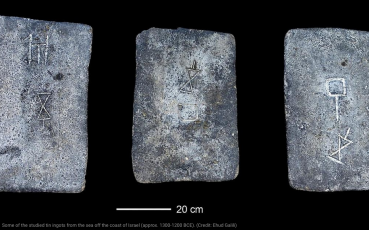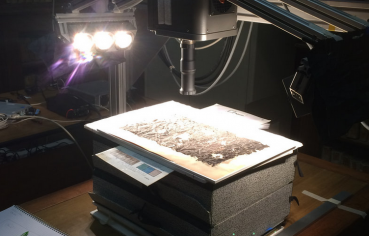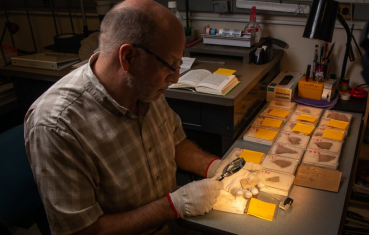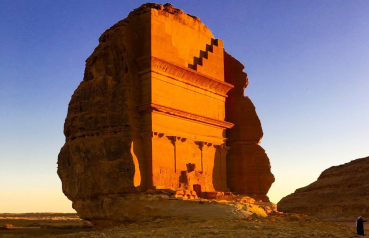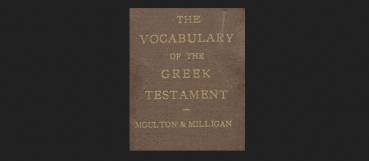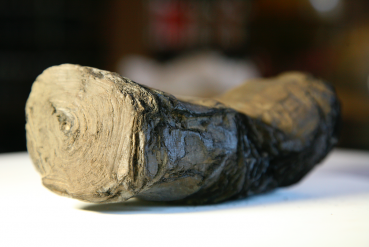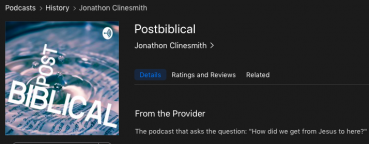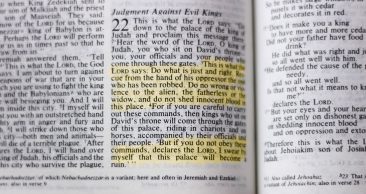A team has reached some fascinating conclusions in their research into the sources of tin at sites 13th and 12th centalong the eastern Mediterranean coast:
Continue readingAnother article on the Infrared Imaging of the Herculaneum scrolls
NPR also has a nice summary article on the imaging of the Herculaneum scrolls and the resultant textual content discoveries from the work.
Continue readingMultispectral Imaging, 2000 Year Old Pottery, and Aramaic
Continue reading“A Columbian College of Arts and Sciences professor is using cutting-edge imaging technology to decipher the inscriptions on fragments of broken pottery excavated more than 50 years ago in Jordan. The fragments, long thought to be lost, were recently rediscovered.”
New research of Nabataean sites in Saudi Arabia
A BBC article about new archeological surveys of Nabataean sites in northern Saudi Arabia. The Nabataeans are best known today for the ruins at Petra.
Continue readingResource: The Vocabulary of the Greek Testament
Biblicalstudies.org.uk provides great free, open-source, and online resources for the study of the Bible. This week they posted the addition of The Vocabulary of the Greek Testament, a lexicon by Moulton and Milligan (printed in 1929 and in the public domain). If you are a student of Greek and the New Testament, you may want to download this PDF from their website.
Continue readingVirtually Unrolling Ancient Scrolls
Good and quick article regarding the latest use of technology to potentially read ancient manuscripts: “2,000-year-old Herculaneum Scrolls”
Continue readingPostBiblical Podcast
My friend Jonathon Clinesmith has started a new podcast called PostBiblical. I’m honored that he included me in the first three episodes dealing with a bit of the background and context for the life of Jesus and the New Testament.
The direct feed link for the podcast is here. Here are the links for iTunes or Spotify users.
Patrick Henry on Torture and the Eighth Amendment of the Constitution
When debating the Constitutional amendments that would eventually become the Bill of Rights, Patrick Henry advocated strongly for an amendment providing for protections against the use of “excessive bail and fines” and “cruel and unusual punishment.” His case was this: While our governing representatives could be allowed latitude to write laws defining crimes and enforcing punishment, they could not be trusted with the same (or any) latitude when it came to ensuring limits to punitive actions. He stated: “But when we come to punishments, no latitude ought to be left, nor dependence put on the virtue of representatives.” Continue reading
Thoughts on the Prophets and Jesus
Studying the Hebrew prophets is a regular act of realizing that, as Abraham Heschel addressed, distinguishing between the pathos of the prophet & the pathos God is often impossible. In Jeremiah, for example, it can be unclear if it is Jeremiah who is weeping for his people or God. Continue reading
Some Thoughts on Patriotism
In the United States one of the most patriotic things we can do is examine, question, and critically challenge both our government and our social values. This is one of the core principles that made the founding of our nation unique in its time and (at our best) is a model and standard for other nations. Continue reading
An Early Description of Christians
A description of Christians from the Epistle to Diognetus by an author named Mathētēs (“disciple”). The date of the text is not clear, with estimates ranging from the early 2nd century to the late 3rd century. Continue reading
God’s Warning to A King
Thus says the LORD: “Go down to the house of the king of Judah and speak there this word, and say, ‘Hear the word of the LORD, O king of Judah, who sits on the throne of David, you, and your servants, and your people who enter these gates. Thus says the LORD: Continue reading
